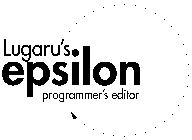 October 2020 - Epsilon 14 Released
October 2020 - Epsilon 14 Released
Epsilon 14 added new features like 64-bit support, file hierarchy comparisons, environment variables (and more) in file names, new commands for source file navigation, highlighting of matching #if/#endif lines, plus enhancements for various language modes and updates to support recent OS versions.
 May 2006 - Epsilon 13 Released
May 2006 - Epsilon 13 Released
Epsilon 13 added new features like macOS support, spell checking, smart indenting for HTML and XML, context-sensitive help, improved source code browsing, dired grep, many more file variables, a mode for Tcl files, line numbers, and many new and improved commands. Here's how to update.
 October 2003 - Epsilon 12 Released
October 2003 - Epsilon 12 Released
Epsilon 12 added new features like new modes for PHP and VHDL, Unicode support, improved pull completion and commenting commands, font styles, session file and dired enhancements, ssh/scp support, new regular expression options, and many other searching improvements, as well as a new customization method that makes updating much easier.
 January 2002 - Epsilon 11 Released
January 2002 - Epsilon 11 Released
Epsilon 11 added new features like Visual Basic and Python modes, improved support for embedded scripting in HTML, a hex mode for binary files, an identifier completion feature that saves typing, support for some types of Unicode files, as well as many file differencing enhancements.
 February 2000 - Epsilon 10 Released
February 2000 - Epsilon 10 Released
Epsilon 10 added new features like Perl mode, support for Linux and FreeBSD, and online documentation in Info and web formats.
 October 1997 - Epsilon 9.0 Released
October 1997 - Epsilon 9.0 Released
Epsilon 9.0 added new features like built-in asynchronous Internet functions, auto ID of file types, NT/2000 concurrent process support, modes for HTML and TeX, and more.
 July 1996 - Epsilon 8.0 Released
July 1996 - Epsilon 8.0 Released
This was the first version of Epsilon for Windows. It included a 32-bit executable for Windows 95/Windows NT, plus others for Windows 3.1 and DOS. Among other new new features, this was the first version to include the complete manual in electronic form.
 January 1995 - Epsilon 7.0 Released
January 1995 - Epsilon 7.0 Released
It included new features like syntax highlighting, command history, and extended file patterns.
 April 1993 - Epsilon 6.5 Released
April 1993 - Epsilon 6.5 Released
Its new features included mouse support and a menu bar.
 July 1992 - Epsilon 6.0 Released
July 1992 - Epsilon 6.0 Released
Some of its new features included on-screen highlighting, pop-up windows, and multi-file searching.
 July 1990 - Epsilon 5.0 Released
July 1990 - Epsilon 5.0 Released
This version featured horizontal scrolling and side-by-side windows.
 October 1989 - Epsilon 4.1 Released
October 1989 - Epsilon 4.1 Released
This was the first version of Epsilon to run on a 32-bit (Unix) platform.
 January 1989 - Epsilon 4.0 Released
January 1989 - Epsilon 4.0 Released
This version of Epsilon introduced undo, tags, and the ability to run very large programs.
 August 1987 - Epsilon 3.2 Released
August 1987 - Epsilon 3.2 Released
This was the first version of Epsilon available for Unix. Two months later, in October 1987, we released the first OS/2 version of Epsilon. (Epsilon was one of the first fifty programs available for OS/2. IBM gave us this lucite plaque. Really.)
 October 1985 - Epsilon 3.0 Released
October 1985 - Epsilon 3.0 Released
This version introduced Epsilon's EEL extension language.
 January 1985 - Epsilon 2.0 Released
January 1985 - Epsilon 2.0 Released
This version introduced the concurrent process buffer, which lets you run programs like compilers and continue editing while they run (even under DOS).
 August 1984 - Epsilon 1.1 Released
August 1984 - Epsilon 1.1 Released
The very first version of Epsilon. Epsilon is over thirty five years old!
